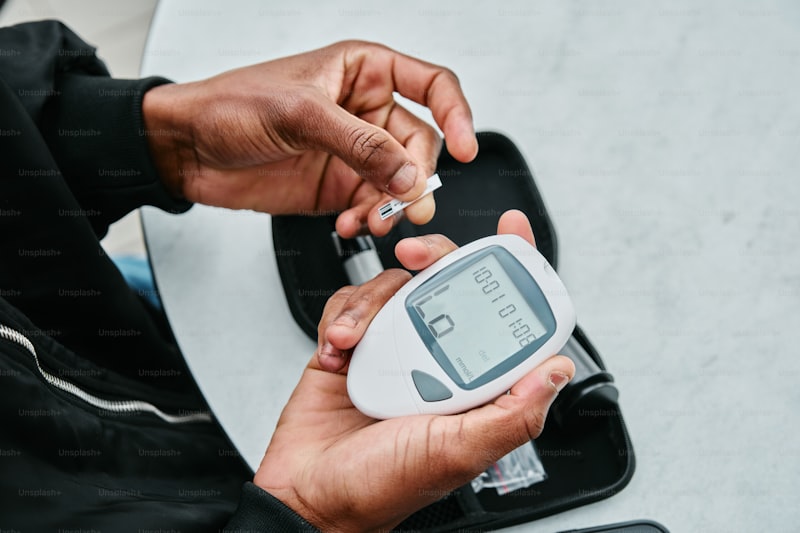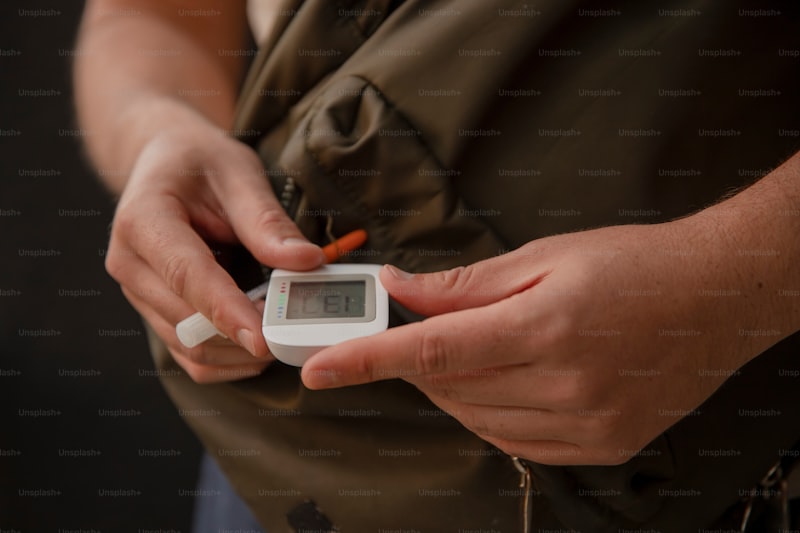A balanced diet is the cornerstone of diabetes management. Focus on complex carbohydrates like whole grains, fruits, and vegetables that release glucose slowly, preventing spikes in blood sugar levels. Incorporating lean proteins and healthy fats helps maintain satiety and regulates blood sugar throughout the day.
Physical activity is crucial for managing diabetes as it enhances insulin sensitivity and promotes glucose uptake by muscles. Aim for a combination of aerobic exercises like brisk walking or cycling and strength training exercises to improve overall fitness and blood sugar control.
Chronic stress can elevate blood sugar levels by triggering the release of hormones like cortisol and adrenaline. Practice relaxation techniques such as deep breathing, meditation, or yoga to reduce stress levels and improve overall well-being.
Regular monitoring of blood glucose levels provides valuable insights into how lifestyle choices impact diabetes management. It allows individuals to make timely adjustments to their diet, exercise routine, or medication as needed.
Quality sleep plays a vital role in regulating hormones that affect blood sugar levels and overall metabolism. Aim for seven to nine hours of restful sleep each night to support optimal health and diabetes management.
Having a strong support network can positively influence diabetes management. Engage with healthcare professionals, join support groups, or connect with family and friends who understand and encourage healthy lifestyle choices.

Stay informed about diabetes management strategies and advancements in treatment options. Empower yourself with knowledge to make informed decisions about your health and well-being.
By adopting these lifestyle modifications, individuals can effectively manage diabetes and enhance their quality of life. Each choice contributes to a healthier future, demonstrating the power of proactive self-care in managing a chronic condition like diabetes.
Beyond Insulin: How Lifestyle Changes Can Transform Diabetes Management

When we talk about lifestyle changes, we’re not just talking about minor adjustments. We’re talking about a holistic approach that considers every aspect of your daily routine. Let’s break it down:
Dietary Choices: One of the most impactful changes you can make is in your diet. Instead of reaching for sugary snacks or processed foods, opt for whole grains, lean proteins, and plenty of fruits and vegetables. These foods not only help regulate blood sugar levels but also provide essential nutrients that support overall health.
Exercise Routine: Physical activity is another game-changer. Regular exercise helps your body use insulin more efficiently, which can lead to better blood sugar control. Whether it’s walking, swimming, or yoga, finding activities you enjoy makes it easier to stick with them long-term.
Stress Management: Stress can wreak havoc on blood sugar levels. Finding ways to manage stress, such as through meditation, deep breathing exercises, or hobbies you love, can make a world of difference in how you feel and how well you manage your diabetes.
Sleep Quality: Believe it or not, sleep plays a role in diabetes management too. Poor sleep can disrupt your body’s ability to regulate blood sugar levels. Aim for 7-9 hours of quality sleep each night to support overall health.
Monitoring and Support: Regularly monitoring your blood sugar levels and working closely with healthcare providers are essential parts of managing diabetes effectively. They can provide guidance, support, and adjustments to your treatment plan as needed.
The Power of Choices: Lifestyle Strategies for Controlling Diabetes
The cornerstone of diabetes management lies in what you eat. Opting for a balanced diet rich in fiber, whole grains, lean proteins, and healthy fats helps regulate blood sugar levels. Foods with a low glycemic index, such as vegetables, fruits like berries and apples, and whole grains like quinoa and oats, can prevent spikes in blood sugar. Making small, gradual changes in dietary habits, like reducing sugary beverages and refined carbohydrates, can yield significant improvements in managing diabetes.
Regular physical activity is another powerful tool in diabetes management. Exercise helps insulin work more efficiently, lowering blood sugar levels naturally. Activities like brisk walking, cycling, swimming, or even gardening not only improve blood circulation but also contribute to weight management and overall well-being. Incorporating exercise into daily routines fosters a healthier lifestyle and reduces the risk of complications associated with diabetes.
Stress can adversely affect blood sugar levels by triggering hormone responses that raise glucose. Practicing stress-reducing techniques such as deep breathing, yoga, meditation, or engaging in hobbies can help mitigate these effects. Building a support network of friends, family, or support groups can provide emotional support and practical advice in managing stress associated with diabetes.
Regular monitoring of blood sugar levels is essential for understanding how lifestyle choices affect diabetes management. Keeping a record of these levels empowers individuals to make informed decisions about diet, exercise, and medication adjustments. For those requiring medication or insulin therapy, adhering to prescribed treatments and maintaining regular check-ups with healthcare providers ensures optimal management of diabetes.
Staying informed about diabetes through reliable sources empowers individuals to make knowledgeable decisions about their health. Educational resources, support groups, and healthcare providers offer valuable insights into new research, treatment options, and lifestyle strategies tailored to individual needs.
By integrating these lifestyle strategies into daily routines, individuals can take proactive steps towards managing diabetes effectively. Each choice made—whether it’s a dietary change, exercise regimen, stress management practice, or medication adherence—contributes to better health outcomes and an improved quality of life for those living with diabetes.
Living Well: Lifestyle Tips That Keep Diabetes in Check
Living with diabetes requires a proactive approach to lifestyle choices. It’s not just about managing blood sugar levels but also about embracing a holistic way of life that supports overall well-being. Here are some essential lifestyle tips to help you keep diabetes in check:
-
Mindful Eating: The cornerstone of managing diabetes starts with what you eat. Adopting a balanced diet rich in whole grains, lean proteins, fruits, and vegetables can help stabilize blood sugar levels. Think of your plate as a canvas where colorful, nutrient-dense foods take center stage, supporting your health from within.
-
Regular Physical Activity: Exercise isn’t just beneficial for weight management; it also plays a crucial role in diabetes management. Engaging in regular physical activity helps your body use insulin more effectively, lowering blood sugar levels naturally. Whether it’s a brisk walk, swimming, or yoga, find activities you enjoy and make them part of your daily routine.
-
Stress Management: Chronic stress can wreak havoc on blood sugar levels. Incorporating stress-reducing techniques such as meditation, deep breathing exercises, or hobbies that you love can help keep stress at bay. Remember, a calm mind contributes to better overall health.

Adequate Sleep: Quality sleep is often underestimated but plays a vital role in managing diabetes. Aim for 7-8 hours of uninterrupted sleep each night to support your body’s natural rhythms and hormone regulation. Good sleep hygiene, such as maintaining a regular sleep schedule and creating a relaxing bedtime routine, can make a significant difference.
-
Hydration: Water is essential for overall health, including diabetes management. Staying hydrated helps your kidneys flush out excess sugar from the blood. Aim to drink plenty of water throughout the day, and limit sugary drinks that can spike blood sugar levels.

Regular Health Check-ups: Monitoring your health regularly is key to preventing complications associated with diabetes. Schedule regular check-ups with your healthcare provider to monitor blood sugar levels, blood pressure, cholesterol, and overall health. Early detection and management of any issues can help you stay on track with your health goals.
-
Community Support: Managing diabetes can sometimes feel overwhelming. Seek support from family, friends, or join local or online communities where you can share experiences and tips with others facing similar challenges. Connecting with others can provide valuable emotional support and motivation.

Remember, managing diabetes is not just about following strict guidelines but about making sustainable lifestyle changes that support your health and well-being in the long run. By adopting these lifestyle tips and staying proactive about your health, you can live well with diabetes and enjoy a fulfilling life.
From Diet to Exercise: Lifestyle Tweaks That Make a Big Difference in Diabetes
Managing diabetes isn’t just about medications; it’s a holistic journey that involves making significant lifestyle tweaks. From diet choices to regular exercise, every small change can add up to a big difference in managing blood sugar levels effectively.
Let’s start with diet. The foods we eat play a crucial role in diabetes management. Instead of highly processed meals that spike blood sugar levels, opt for a balanced diet rich in fiber, lean proteins, and healthy fats. Imagine your body as a finely tuned machine — just like you wouldn’t fuel a sports car with low-quality gas, you shouldn’t fuel your body with empty calories. Every bite counts towards stabilizing your glucose levels and keeping you healthy in the long run.
Now, let’s shift our focus to exercise. Physical activity isn’t just about shedding pounds; it’s about improving insulin sensitivity and lowering blood sugar. Think of exercise as your body’s natural insulin — it helps glucose enter your cells, where it’s used for energy rather than accumulating in your bloodstream. Whether it’s brisk walking, swimming, or dancing, find an activity you enjoy and make it a part of your daily routine. Small steps lead to big strides in managing diabetes effectively.
Beyond diet and exercise, managing stress levels is another crucial aspect. Stress hormones can directly impact blood sugar levels, so incorporating relaxation techniques such as meditation or yoga can be beneficial. Imagine stress as a hurdle in a race — managing it effectively allows you to run towards better health without stumbling over spikes in glucose levels.
Managing diabetes isn’t just about what you do; it’s about how each choice contributes to a healthier lifestyle. By making mindful choices in diet, staying active with exercise, and managing stress effectively, you can make a significant impact on your diabetes management journey.
Unlocking Wellness: Lifestyle Habits That Support Diabetes Control
Living with diabetes doesn’t mean giving up on a fulfilling life. In fact, making small yet impactful changes to your daily routine can significantly improve your well-being and help manage diabetes effectively. Let’s explore some lifestyle habits that play a crucial role in supporting diabetes control.
1. Balanced Diet, Balanced Life: Your plate is your powerhouse. Opt for a balanced diet rich in fiber, lean proteins, and healthy fats. Think of your meals as a palette of colors, where vegetables, whole grains, and fruits form the vibrant brushstrokes. By choosing low glycemic index foods, you can maintain steady blood sugar levels and keep those energy spikes at bay.
2. Move Your Body, Move Your Life: Exercise isn’t just about sweating it out at the gym; it’s about finding activities that you genuinely enjoy. Whether it’s brisk walking, dancing, or yoga, regular physical activity helps your body use insulin more efficiently. It’s like oiling the gears of a machine – it keeps everything running smoothly and reduces the risk of complications.
3. Sleep: The Ultimate Recharge: Ever noticed how a good night’s sleep leaves you feeling refreshed and ready to conquer the day? Well, for those managing diabetes, quality sleep is like hitting the reset button. It regulates hormones that control hunger and stress, which in turn helps maintain stable blood sugar levels.
4. Stress Less, Live More: Stress can send your blood sugar levels on a rollercoaster ride. Practicing relaxation techniques such as deep breathing, meditation, or even spending time with loved ones can work wonders. Think of stress as a storm; finding calm waters keeps your diabetes management on a steady course.
5. Knowledge is Power: Understanding your condition empowers you to make informed decisions. Stay informed about diabetes through reliable sources, and don’t hesitate to ask your healthcare team questions. Knowledge is your compass; it guides you towards choices that support your health goals.
6. Small Steps, Big Wins: Rome wasn’t built in a day, and neither is a healthy lifestyle. Focus on making small, sustainable changes. Celebrate every victory, no matter how small, because each step towards better health is a triumph in itself.
By embracing these lifestyle habits, you’re not just managing diabetes – you’re unlocking a pathway to overall wellness. It’s about nurturing your body, mind, and spirit in harmony, creating a life where diabetes doesn’t define you but empowers you to live your best life possible.
Frequently Asked Questions
What are the best foods to manage diabetes naturally
Discover the best foods that naturally help manage diabetes. Learn which foods can stabilize blood sugar levels and support overall health.
What lifestyle changes can help lower blood sugar levels
Learn about effective lifestyle changes that can help lower blood sugar levels naturally, such as adopting a balanced diet rich in fiber and low in refined sugars, engaging in regular physical activity, maintaining a healthy weight, managing stress levels, and ensuring adequate sleep.
Can stress management techniques improve diabetes management
Stress management techniques can positively impact diabetes management by helping to lower stress hormones like cortisol, which can affect blood sugar levels. Techniques such as mindfulness, exercise, and relaxation methods can complement medical treatment to improve overall health outcomes for individuals with diabetes.
Are there specific habits to avoid for better diabetes control
Discover key habits to avoid that can improve diabetes control. Learn practical tips for managing your condition effectively.
How does regular exercise help in controlling diabetes
Learn how regular exercise can effectively manage diabetes by improving insulin sensitivity, lowering blood sugar levels, and promoting weight management. Discover the benefits of physical activity in reducing the risk of complications associated with diabetes.



